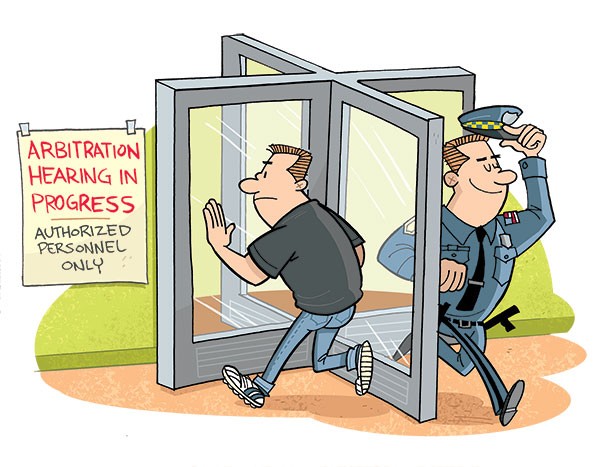In June 2008, after downing six drinks as part of his wife's birthday celebration on the South Side, Paul Abel was accused of accidentally shooting a 20-year-old man he was trying to pistol-whip.
In December 2009, Eugene Hlavac was accused of slapping his ex-girlfriend (and his son's mother) so hard that he dislocated her jaw.
And in November 2010, Garrett Brown was accused of running two delivery-truck drivers off the road in a fit of rage — an allegation similar to those made against Brown in at least one other late-night traffic encounter.
Each of these men, who were all Pittsburgh Police officers at the time of the incidents, shares a common experience: They all were fired, charged criminally, cleared of those charges ... and then got their jobs back through arbitration.
And they're not alone. Nine officers were fired by the city between 2009 and 2013, but five of those terminations were overturned by an arbitrator, according to Pittsburgh Public Safety Director Mike Huss. (In all, says Huss, the city filed 269 disciplinary-action reports in that period, 33 of which involved suspensions.) In the cases where terminations were appealed by the police union through arbitration, officers got their jobs back close to 70 percent of the time, according to figures provided by Huss.
"We have seen egregious misconduct," says Vic Walczak, the Pennsylvania American Civil Liberties Union's legal director. "By the time the process is over, no one is disciplined unless they're sitting in jail."
Since public-safety unions can't strike, arbitration plays a central role in settling disputes with management. Under the city's contract with the Fraternal Order of Police (the police union), officers have the right to appeal discipline imposed by the city through an arbitration process. A panel, usually comprised of one representative each from the city, the union and a third "neutral" arbitrator, decides whether the city's decision was justified.
Police unions are successful in overturning about 62 percent of disciplinary decisions nationwide, according to Will Aitchison, director of Labor Relations Information System, an organization that tracks trends in public-sector unions and holds police discipline seminars.
But if the neutral arbitrator is indeed neutral, why do police unions have so much success reversing terminations? There's no simple answer to that question, and it divides city and union officials.
Is it because police unions cherry-pick their cases, only appealing terminations for disciplinary issues that clearly warrant some lesser punishment? Or do arbitrators skew their findings in hopes that favorable rulings will encourage the union to challenge decisions more often? Such questions are hard to resolve, in part because the opinions arbitrators write to justify their findings are not considered public under state law. And that, some experts suggest, both undermines public confidence in the police force and helps keep troubled officers on the streets.


